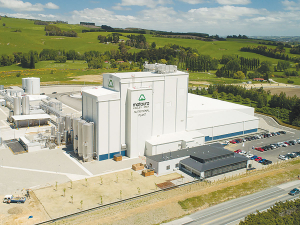Two milk processing plants changing hands
Two large milk processing plants in New Zealand are changing hands.
 Mataura Valley Milk is the first dairy company of its size to make the transition, possibly in the world.
Mataura Valley Milk is the first dairy company of its size to make the transition, possibly in the world.
Southland's Mataura Valley Milk has embarked on a major project to fully electrify its plant near Gore onto "100% renewable energy" by November next year.
MVM chief executive Bernard May says "Project Recharge" will be a huge miletone for the industry, making MVM the first dairy company of its size to make the transition, possibly in the world.
Central to the project is the installation of a modern high-pressure electrode boiler capable of producing steam at up to 40 bar pressure to supply heat to spray driers and other processes.
It will replace a very modern coal boiler installed when the plant was built only a little over six years ago.
But May says the coal boiler typically burns about 30 tonnes of lignite a day through the season, so the project will allow MVM to eliminate 22,000 tonnes of CO2 emissions annually.
Electrode boilers achieve very high efficiency by passing current directly through the water itself rather than through a discrete heating element. While some are already operating in the dairy industry, none produce such high pressure, says May. The technology did not exist six years ago.
"It is just the right thing to do, given the technology that's now available. It's the right thing to do for our people, it's the right thing to do for the brand, and for the community."
He says the company had the foresight six years ago to allow for additional electrification so that infrastructure already existed. It has worked with the local lines company PowerNet on distribution agreements that will accommodate the extra load.
May says the plant is already the most modern with a lot of efficiency already designed in, such as recovering water from the milk drying operation.
Machinery such as forklifts are already 100% electric. May says the project is aligned with the company's mission of being New Zealand's most sustainable dairy company by creating highly sustainable supply chain and "the lowest footprint that we can for our customers".
MVM is now about 75% owned by the A2 Milk Company, with most of the balance held by the China Animal Husbandry Group, whose initial investment was vital in getting the company off the ground in 2016.
Project Recharge was recently recognised by Environment Southland, being named a special award winner at the recent annual ES Community Awards.
Environment Southland chairman Nicol Horrell said the calibre of nominees was incredibly high, featuring diverse nominations from catchment groups and tourism operators, through to farmers, food recovery organisations and school children.
"They are our environmental innovators and leaders. These people are just getting on with things as Southlanders so often do, inspiring others and paving the way forward."
The judges commented that MVM was leading the way in the climate change space, with Project Recharge being "the most significant thing happening nationwide in that space at the moment".
"They have taken some big risks but are doing the right thing environmentally despite the costs, and are an example of industry stepping up and making a significant change."
Accepting the award on MVM's behalf, MVM capital projects manager Scott Waddell remarked that "It's better for the environment - it's better for everyone."
Fonterra’s impending exit from the Australian dairy industry is a major event but the story doesn’t change too much for farmers.
Expect greater collaboration between Massey University’s school of Agriculture and Environment and Ireland’s leading agriculture university, the University College of Dublin (UCD), in the future.
A partnership between Torere Macadamias Ltd and the Riddet Institute aims to unlock value from macadamia nuts while growing the next generation of Māori agribusiness researchers.
A new partnership between Dairy Women’s Network (DWN) and NZAgbiz aims to make evidence-based calf rearing practices accessible to all farm teams.
Despite some trying circumstances recently, the cherry season looks set to emerge on top of things.
Changed logos on shirts otherwise it will be business as usual when Fonterra’s consumer and related businesses are expected to change hands next month.
OPINION: Fonterra may be on the verge of selling its consumer business in New Zealand, but the co-operative is not…
OPINION: What does the birth rate in China have to do with stock trading? Just ask a2 Milk Company.